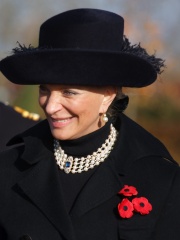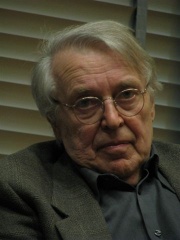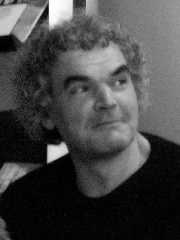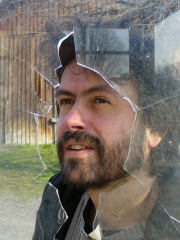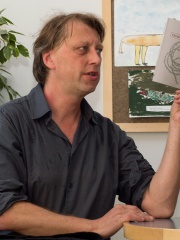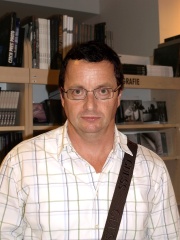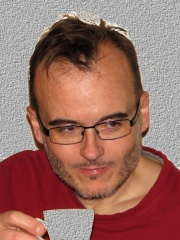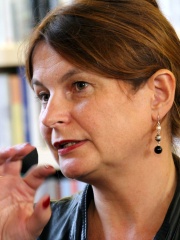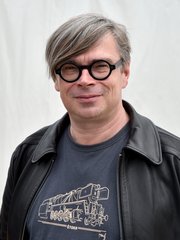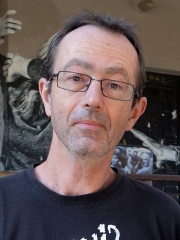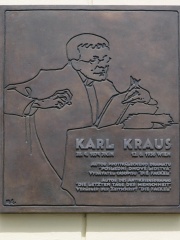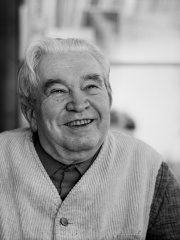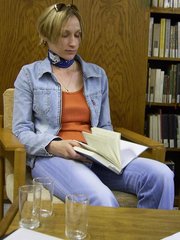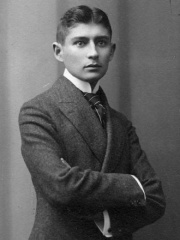

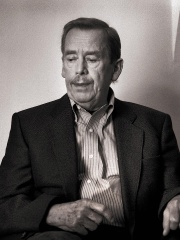

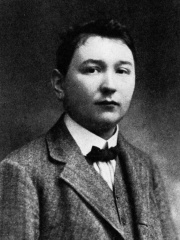
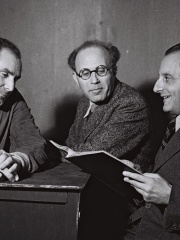
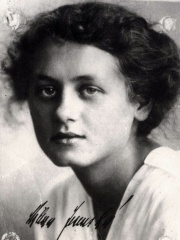
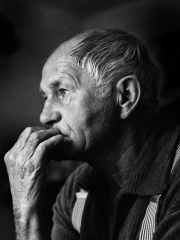
The Most Famous
WRITERS from Czechia
Top 10
The following people are considered by Pantheon to be the top 10 most legendary Czech Writers of all time. This list of famous Czech Writers is sorted by HPI (Historical Popularity Index), a metric that aggregates information on a biography's online popularity. Visit the rankings page to view the entire list of Czech Writers.

1. Franz Kafka (1883 - 1924)
With an HPI of 89.62, Franz Kafka is the most famous Czech Writer. His biography has been translated into 171 different languages on wikipedia.
Franz Kafka (3 July 1883 – 3 June 1924) was a German-language Jewish Czech writer and novelist born in Prague, in the Austro-Hungarian Empire. Widely regarded as a major figure of 20th-century literature, his works fuse elements of realism and the fantastique, and typically feature isolated protagonists facing bizarre or surreal predicaments and incomprehensible socio-bureaucratic powers. The term Kafkaesque has entered the lexicon to describe situations like those depicted in his writings. His best-known works include the novella The Metamorphosis (1915) and the novels The Trial (1924) and The Castle (1926). He is also celebrated for his brief fables and aphorisms, which frequently incorporated comedic elements alongside the darker themes of his longer works. His work has widely influenced artists, philosophers, composers, filmmakers, literary historians, religious scholars, and cultural theorists, and his writings have been seen as prophetic or premonitory of a totalitarian future. Kafka was born into a middle-class German- and Yiddish-speaking Czech Jewish family in Prague, the capital of the Kingdom of Bohemia, which belonged to the Austro-Hungarian Empire (later the capital of Czechoslovakia and the Czech Republic). He trained as a lawyer, and after completing his legal education was employed full-time in various legal and insurance jobs. His professional obligations led to internal conflict as he felt that his true vocation was writing. Only a minority of his works were published during his life; the story collections Contemplation (1912) and A Country Doctor (1919), and individual stories, such as his novella The Metamorphosis, were published in literary magazines, but they received little attention. He wrote hundreds of letters to family and close friends, including his father, with whom he had a strained and formal relationship. He became engaged to several women but never married. He died relatively unknown in 1924 of tuberculosis, aged 40. His literary executor and friend Max Brod ignored Kafka's wishes to destroy his remaining works, publishing them to eventual acclaim.

2. Milan Kundera (1929 - 2023)
With an HPI of 82.06, Milan Kundera is the 2nd most famous Czech Writer. His biography has been translated into 83 different languages.
Milan Kundera (UK: KU(U)N-dər-ə; Czech: [ˈmɪlan ˈkundɛra] ; 1 April 1929 – 11 July 2023) was a Czech and French novelist. Kundera went into exile in France in 1975, acquiring citizenship in 1981. His Czechoslovak citizenship was revoked in 1979, but he was granted Czech citizenship in 2019. Kundera's best-known work is The Unbearable Lightness of Being. Before the Velvet Revolution of 1989, the country's ruling Communist Party of Czechoslovakia banned his books. He led a low-profile life and rarely spoke to the media. He was thought to be a contender for the Nobel Prize in Literature and was also a nominee for other awards. Kundera was awarded the Jerusalem Prize in 1985, the Austrian State Prize for European Literature in 1987, and the Herder Prize in 2000. In 2021, he received the Golden Order of Merit from the president of Slovenia, Borut Pahor.

3. Václav Havel (1936 - 2011)
With an HPI of 81.32, Václav Havel is the 3rd most famous Czech Writer. His biography has been translated into 110 different languages.
Václav Havel (Czech: [ˈvaːt͡slav ˈɦavɛl] ; 5 October 1936 – 18 December 2011) was a Czech statesman, author, poet, playwright, and dissident. Havel served as the last president of Czechoslovakia from 1989 until 1992, prior to the dissolution of Czechoslovakia on 31 December, before he became the first president of the Czech Republic from 1993 to 2003. He was the first democratically elected president of either country after the fall of communism. As a writer of Czech literature, he is known for his plays, essays and memoirs. His educational opportunities having been limited by his bourgeois background under the Czechoslovak Socialist Republic, Havel first rose to prominence as a playwright. In works such as The Garden Party and The Memorandum, Havel used an absurdist style to criticize the Communist system. After participating in the Prague Spring and being blacklisted after the Warsaw Pact invasion of Czechoslovakia, he became more politically active and helped found several dissident initiatives, including Charter 77 and the Committee for the Defense of the Unjustly Prosecuted. His political activities brought him under the surveillance of the StB secret police, and he spent several periods as a political prisoner, the longest of his imprisoned terms being nearly four years, between 1979 and 1983. Havel's Civic Forum party played a major role in the Velvet Revolution that toppled the Communist system in Czechoslovakia in 1989. He assumed the presidency shortly thereafter, and was re-elected in a landslide the following year and after Slovak independence in 1993. Havel was instrumental in dismantling the Warsaw Pact and enlargement of NATO membership eastward. Many of his stances and policies, such as his opposition to Slovak independence, condemnation of the treatment of Sudeten Germans and their mass expulsion from Czechoslovakia after World War II, as well as granting of general amnesty to all those imprisoned under the Communist era, were very controversial domestically. By the end of his presidency, he enjoyed greater popularity abroad than at home. Havel continued his life as a public intellectual after his presidency, launching several initiatives including the Prague Declaration on European Conscience and Communism, the VIZE 97 Foundation, and the Forum 2000 annual conference. Havel's political philosophy was one of anti-consumerism, humanitarianism, environmentalism, civil activism, and direct democracy. He supported the Czech Green Party from 2004 until his death. He received numerous accolades during his lifetime, including the Presidential Medal of Freedom, the Gandhi Peace Prize, the Philadelphia Liberty Medal, the Order of Canada, the Four Freedoms Award, the Ambassador of Conscience Award, and the Hanno R. Ellenbogen Citizenship Award. The 2012–2013 academic year at the College of Europe was named in his honour. He is considered by some to be one of the most important intellectuals of the 20th century. The international airport in Prague was renamed Václav Havel Airport Prague in 2012.

4. Rainer Maria Rilke (1875 - 1926)
With an HPI of 80.94, Rainer Maria Rilke is the 4th most famous Czech Writer. His biography has been translated into 85 different languages.
René Karl Wilhelm Johann Josef Maria Rilke (4 December 1875 – 29 December 1926), known as Rainer Maria Rilke, was an Austrian poet and novelist. Acclaimed as an idiosyncratic and expressive poet, he is widely recognized as a significant writer in the German language. His work is viewed by critics and scholars as possessing undertones of mysticism, exploring themes of subjective experience and disbelief. His writings include one novel, several collections of poetry, several volumes of correspondence and a few early novellas. Rilke travelled extensively throughout Europe, finally settling in Switzerland, which provided the inspiration for many of his poems. While Rilke is best known for his contributions to German literature, he also wrote in French. Among English-language readers, his best-known works include two poetry collections: Duino Elegies (Duineser Elegien) and Sonnets to Orpheus (Die Sonette an Orpheus), a semi-autobiographical novel The Notebooks of Malte Laurids Brigge (Die Aufzeichnungen des Malte Laurids Brigge), and a collection of ten letters published posthumously Letters to a Young Poet (Briefe an einen jungen Dichter). In the later 20th century, his work found new audiences in citations by self-help authors and frequent quotations in television shows, books and motion pictures.
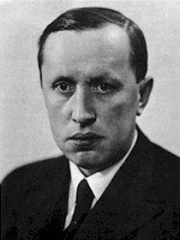
5. Karel Čapek (1890 - 1938)
With an HPI of 77.96, Karel Čapek is the 5th most famous Czech Writer. His biography has been translated into 78 different languages.
Karel Čapek (; Czech: [ˈkarɛl ˈtʃapɛk] ; 9 January 1890 – 25 December 1938) was a Czech writer, playwright, critic and journalist. He has become best known for his science fiction, including his novel War with the Newts (1936) and play R.U.R. (Rossum's Universal Robots, 1920), which introduced the word robot. He also wrote many politically charged works dealing with the social turmoil of his time. Influenced by American pragmatic liberalism, he campaigned in favor of free expression and strongly opposed the rise of both fascism and communism in Europe. Though nominated for the Nobel Prize in Literature seven times, Čapek never received it. However, several awards commemorate his name, such as the Karel Čapek Prize, awarded every other year by the Czech PEN Club for literary work that contributes to reinforcing or maintaining democratic and humanist values in society. He also played a key role in establishing the Czechoslovak PEN Club as a part of International PEN. Čapek died on the brink of World War II as the result of a lifelong medical condition. His legacy as a literary figure became well established after the war.

6. Jaroslav Hašek (1883 - 1923)
With an HPI of 76.68, Jaroslav Hašek is the 6th most famous Czech Writer. His biography has been translated into 69 different languages.
Jaroslav Hašek (Czech: [ˈjaroslaf ˈɦaʃɛk]; 1883–1923) was a Czech writer, humorist, satirist, journalist, bohemian, first anarchist and then communist, and commissar of the Red Army against the Czechoslovak Legion. He is best known for his novel The Fateful Adventures of the Good Soldier Švejk During the World War, an unfinished novel about a soldier in World War I and a satire on the ineptitude of authority figures. The novel has been translated into about 60 languages, making it the most translated novel in Czech literature.

7. Max Brod (1884 - 1968)
With an HPI of 75.54, Max Brod is the 7th most famous Czech Writer. His biography has been translated into 53 different languages.
Max Brod (Hebrew: מקס ברוד; 27 May 1884 – 20 December 1968) was an Israeli author, composer and journalist, born as a German-speaking Czech. He is notable for promoting the work of writer Franz Kafka and composer Leoš Janáček. Although he was a prolific writer in his own right, he is best remembered as the friend and biographer of Franz Kafka. Kafka named Brod as his literary executor, instructing Brod to burn his unpublished work upon his death. Brod refused and had Kafka's works published instead. In 1939, as the Nazis occupied Prague, he immigrated to Mandatory Palestine, taking with him a suitcase of Kafka's papers, many of them unpublished notes, diaries, and sketches.

8. Milena Jesenská (1896 - 1944)
With an HPI of 73.08, Milena Jesenská is the 8th most famous Czech Writer. Her biography has been translated into 38 different languages.
Milena Jesenská (Czech: [ˈmɪlɛna ˈjɛsɛnskaː]; 10 August 1896 – 17 May 1944) was a Czech journalist, writer, editor and translator. She is noted for her correspondence with the author Franz Kafka and was one of the first to translate his work from the German language. After the Nazi invasion of Czechoslovakia, she joined a resistance movement to help Jews and other refugees. She died in Ravensbrück, a Nazi prison camp.

9. Bohumil Hrabal (1914 - 1997)
With an HPI of 71.76, Bohumil Hrabal is the 9th most famous Czech Writer. His biography has been translated into 48 different languages.
Bohumil Hrabal (Czech pronunciation: [ˈboɦumɪl ˈɦrabal]; 28 March 1914 – 3 February 1997) was a Czech writer, often named among the best Czech writers of the 20th century.
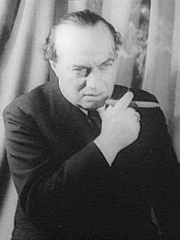
10. Franz Werfel (1890 - 1945)
With an HPI of 71.31, Franz Werfel is the 10th most famous Czech Writer. His biography has been translated into 45 different languages.
Franz Viktor Werfel (German: [fʁant͡s ˈvɛʁfl̩] ; 10 September 1890 – 26 August 1945) was a Czech novelist, playwright, and poet whose career spanned World War I, the Interwar period, and World War II. He is primarily known as the author of The Forty Days of Musa Dagh (1933, English tr. 1934, 2012), a novel based on events that took place during the Armenian genocide of 1915, and The Song of Bernadette (1941), a novel about the life and visions of the French Catholic saint Bernadette Soubirous, which was made into a Hollywood film of the same name.
People
Pantheon has 91 people classified as Czech writers born between 1045 and 1972. Of these 91, 10 (10.99%) of them are still alive today. The most famous living Czech writers include Princess Michael of Kent, Pavel Kohout, and Patrik Ouředník. The most famous deceased Czech writers include Franz Kafka, Milan Kundera, and Václav Havel. As of April 2024, 2 new Czech writers have been added to Pantheon including Hana Andronikova, and Jaroslav Rudiš.
Living Czech Writers
Go to all RankingsPrincess Michael of Kent
1945 - Present
HPI: 63.79
Pavel Kohout
1928 - Present
HPI: 61.92
Patrik Ouředník
1957 - Present
HPI: 56.38
Michal Šanda
1965 - Present
HPI: 51.21
Jáchym Topol
1962 - Present
HPI: 50.79
Michal Viewegh
1962 - Present
HPI: 47.67
Milan Ohnisko
1965 - Present
HPI: 47.66
Radka Denemarková
1968 - Present
HPI: 45.49
Jaroslav Rudiš
1972 - Present
HPI: 44.57
Petr Zelenka
1967 - Present
HPI: 44.22
Deceased Czech Writers
Go to all RankingsFranz Kafka
1883 - 1924
HPI: 89.62
Milan Kundera
1929 - 2023
HPI: 82.06
Václav Havel
1936 - 2011
HPI: 81.32
Rainer Maria Rilke
1875 - 1926
HPI: 80.94
Karel Čapek
1890 - 1938
HPI: 77.96
Jaroslav Hašek
1883 - 1923
HPI: 76.68
Max Brod
1884 - 1968
HPI: 75.54
Milena Jesenská
1896 - 1944
HPI: 73.08
Bohumil Hrabal
1914 - 1997
HPI: 71.76
Franz Werfel
1890 - 1945
HPI: 71.31
Karl Kraus
1874 - 1936
HPI: 71.03
Jaroslav Seifert
1901 - 1986
HPI: 70.81
Newly Added Czech Writers (2025)
Go to all RankingsOverlapping Lives
Which Writers were alive at the same time? This visualization shows the lifespans of the 25 most globally memorable Writers since 1700.

